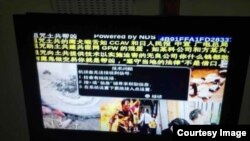Television broadcasts in the Chinese city of Wenzhou were hacked Friday with anti-Communist Party messages superimposed on normal broadcasting.
The attacks began around 7:30 p.m. local time.
According to Foreign Policy, which first reported the hack: “One message, emblazoned across the top of the screen, declared, ‘Damn the Chinese Communist Party's mouthpieces: China Central Television, Peoples' Daily’ -- the first a broadcaster, the latter a newspaper, and both generally acknowledged to toe the party line -- as well as ‘the Propaganda Department and the State Radio and Film Administration.’”
The Propaganda Department and the State Radio and Film Administration are responsible for censorship.
Another message read "the Communist bandits are the real criminals," and another said "Friends, do not cooperate with Communist devils," according to Foreign Policy.
Yet another called for the release of jailed dissident Liu Xiaobo.
“As all programming is now digital, the integrity of the television data stream will determine if one can mount an attack, apparently there was a vulnerability in China's data feeds,” said Christopher Burgess, CEO of Prevendra, Inc., an Internet security firm.
No one has claimed responsibility for the hack.
Weibo, often referred to as Chinese Twitter, lit up with posts about the hacking, but Chinese censors were quick to act and delete mentions of the incident.
A study last year estimated that 30 percent of deletions on Weibo occur within five to 30 minutes after posting and that nearly 90 percent of the deletions happen within the first 24 hours.
While website defacement is a common form of hacktivisim in China, commandeering television signals is not.
However, the Wenzhou case is not the first time it has happened. In 2002, outlawed spiritual group Falun Gong was able to briefly broadcast its messages on televisions in Harbin, Laiyang and Changchun, according to Reuters.
In 2004, Falun Gong as accused of hijacking a Hong Kong satellite.
According to Doug Young, a journalism professor at Fudan University in Shanghai and author of the book The Party Line: How the Media Dictates Public Opinion in Modern China, Wenzhou would be a likely place for this kind of thing to happen.
Wenzhou, he said, is famous for its entrepreneurial and independent spirits, but recent economic turmoil, including a major drop in real estate prices, might foster this kind of hacktivisim.
“This seems like the perfect place for this to happen,” he said.










